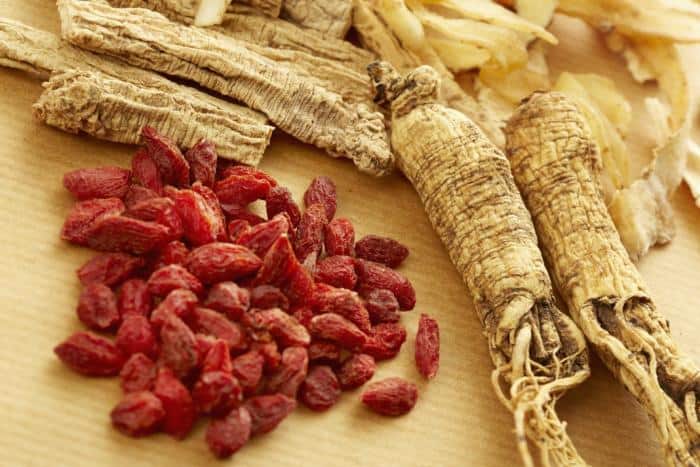Lycium barbarum or wolf berry is commonly called goji berry.
There are two man species that produce commercially available goji berries – Lycium chinense and Lycium barbarum. They belong to the same Solanaceae family as eggplant, deadly nightshade, tomato and potato. This plant is a woody, deciduous variety that grows to 1-3m in height.
The fruits are 2-3cm in diameter and have a tangy sweet and sour taste. Most of the goji berries available commercially are grown in Mongolia, parts of China and the Himalayan valleys of Nepal and Tibet.
Fresh fruits are rarely available outside the growing areas. Usually the fruits are carefully picked and dried in low temperatures and sold as dried berries.
They can be eaten raw, brewed into goji tea, made into juice or smoothies and used to flavor muffins, soups, salads, trail mixes or energy bars.
The nutrient content in goji berries differ based on their geographic growing regions, farming and harvesting practices followed and the way the fruits are handled and dried.
Ideally, goji berries are rich in macronutrients like proteins, carbohydrates, dietary fiber and fat.
They contain minerals, vitamins and phytochemicals like polysaccharides, monosaccharides, unsaturated fats such as alpha-linolenic and linoleic acid both of which are essential fatty acids, phytosterols, carotenoids like beta-carotene, zeaxanthin, lycopene etc., phenolic pigments that have antioxidant properties, 18 amino acids, 6 essential vitamins and 22 trace minerals.
Having such a wide range of nutrients, goji berries have been used in Chinese medicine for several centuries.
It is said to protect the liver, treat eye disorders, improve circulation, boost sperm count, control cholesterol levels, improve sleep patterns, help with organ maintenance, fight free radicals and has immense antioxidant, anti-inflammatory and anti-cancer properties.

What Is The Ideal Dosage Of Goji Berries?
The daily dosage of goji berries depends on the age and health of each individual. A serving size of dried goji berries (5 tablespoons) gives us 5.5% DV of calories.
DV refers to the daily value for a typical diet of 2000 calories. This will vary for each person. From this we get 94 calories of carbohydrates, 14 calories of fat and the remainder from proteins.
For a person who does not have any specific illness, the amount of goji berries taken will depend on the type of the product being consumed. Hence, for healthy people the following could be the recommended daily dosage:
- If they live in goji berry growing areas, the daily dosage is 150g of fresh berries.
- Dried goji berries are most widely available in other areas. The RDA is 10-30g although there is no specific upper limit. A handful of dried goji berries a day will not create any health problems.
- 30ml high quality goji juice taken twice at mealtimes can be consumed daily.
- In Chinese medicine, 5-15g of dried berries is used to make goji tea. This can be drunk once and makes around ½ a cup.
- 2500mg of goji capsules can be taken but only under medical supervision especially if the individual is pregnant or breastfeeding.
If goji berry products are being taken for specific illnesses, then the dosage depends on the illness.
The following is the daily dosage in milliliters. Please note these are just guidelines and it is best to consult your doctor in case of any confusion.
- Anti-aging – 30-60ml
- Blood boosting – 30ml
- Increase energy levels – 75ml
- Inflammatory conditions like arthritis – 30-60ml
- Cancer management – 60-120ml along with other cancer medication
- Reduce cancer risk – 30ml
- Diabetes – 30ml twice daily
- Promote heart health – 60ml
- Gastric disorders – 45ml before meals
- High blood pressure – 45ml
- Infertility (male) – 75ml a day for 4 months
- Improve immunity – 30-60ml
- Liver protection – 15-30ml
- Sexual dysfunction – 30-60ml
- Weight loss – 60ml in 2 divided doses – morning and afternoon
- Eye disorders – 30ml
Summary
Goji berries cannot be taken with warfarin – a blood thinning medication. It can interact adversely with blood pressure and diabetes drugs.
Those with pollen allergies also need to avoid goji berries. It is unknown if goji supplements provide the same benefits as actual fruits – dried or fresh.
Given the multitude of nutrients found in goji berries, everyone can add a little to their daily diet, after consulting their doctors.

your guildlines are in milliliters (ml), so does that means you were referring to goji juice? because what I have are dried goji berries..
Hi Peter, [I just found your post.] I don't know for sure, but I believe 1-2 teaspoons of dried gojis per day, will give you all the benefits. [If you eat too many you will get diahorrea]. You'll soon know how many to eat !!
[I eat them for my macular degeneration]. ♥
I just started using them today as I have been diagnosed with wet macular degeneration.
Here is hoping that they work.
I bought some goji extract 500 mg per capsule. Once a day. I never had a worse headache in my life which went on throughout the night. Scared me to death. Just that one capsule, made me feel terrible. I don’t want to give up on them just yet. So I am thinking, maybe if I opened the capsule and just take one third of the powder, maybe that’ll work. I too wanted to take them for my eyes and overall health. What does everyone else think?
I take one capsule daily as an anti aging treatment. 750 mg in one capsule.
I Really like you product, but would like to know more about the negative side effect of Chines Wolfberry.